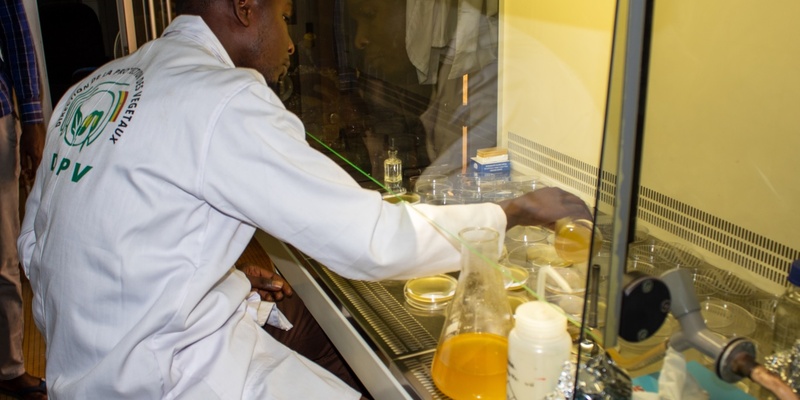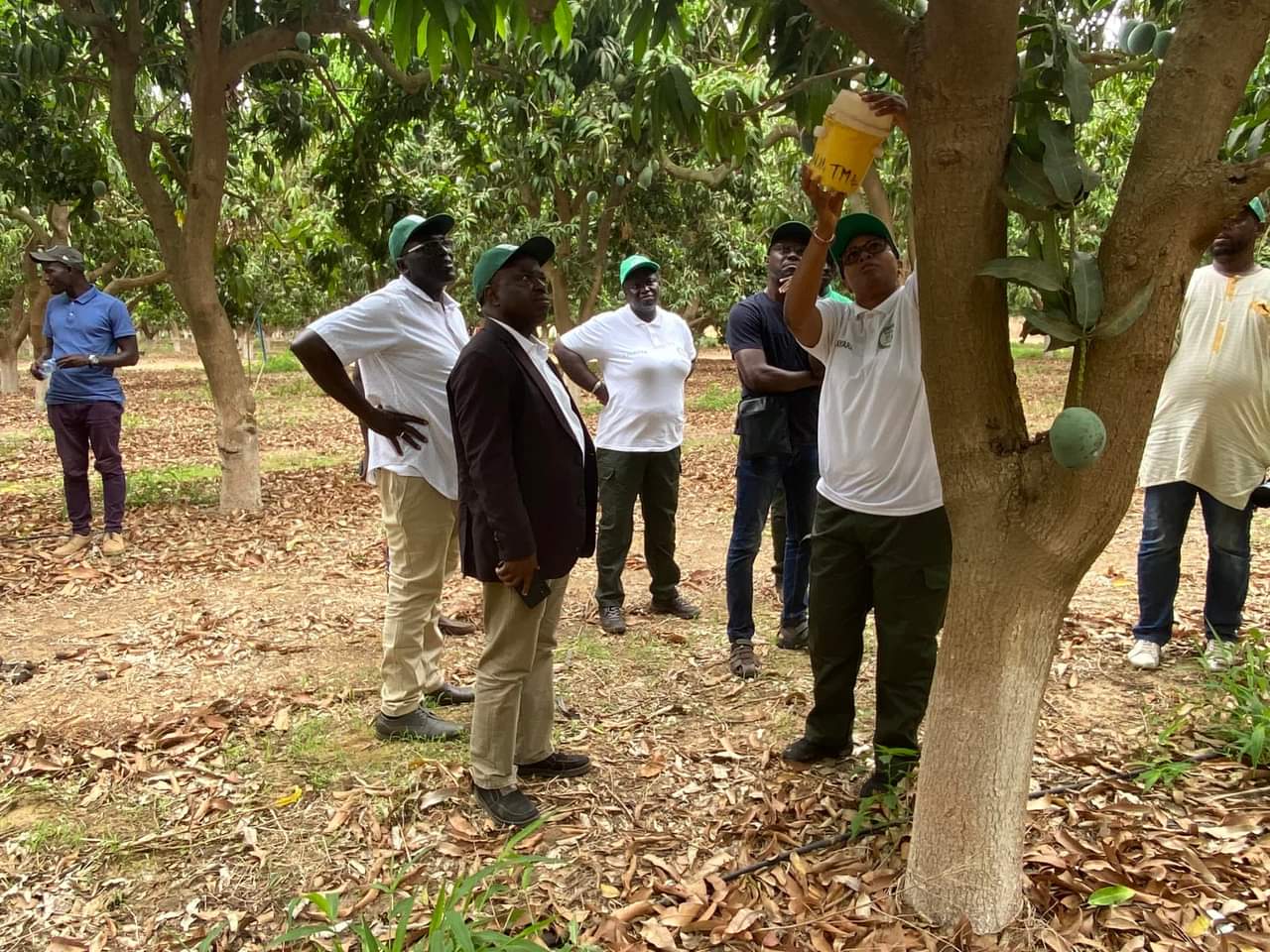SPOTLIGHT: Building a resilient plant health system in Senegal
Posted on Wed, 24 Apr 2024, 11:28

©Direction of Plant Protection, Senegal
In the last decade, Senegal has achieved notable success in the development of its phytosanitary systems, thanks to its participation in various national and international initiatives. This progress has contributed to substantial cereal production in the country and increased volume of exports of cereals and other plant-based products. Agriculture contributes 15 percent to Senegal's Gross Domestic Product (GDP) and employs 40 - 60 percent of the population. However, westernmost country in Africa grapples with the adverse effects of climate change, especially the latter's impact on plant pest infestations, agricultural production and productivity, and the environment.
Through a project titled "IPPC ePhyto and Phytosanitary Capacity Evaluation”, coordinated by the International Plant Protection Convention (IPPC) Secretariat, Senegal was able to elevate its plant health capacity through two important processes: adoption of the IPPC ePhyto Solution and a Phytosanitary Capacity Evaluation. The project was implemented from January 2022 to June 2023, with funding from the German Agency for International Cooperation (GIZ), and support from the Global Alliance for Trade Facilitation and the United Nations International Computing Center (UNICC). The two-pronged approach to a better plant health system in Senegal resulted in the country's ability to attract and secure more technical and financial support from international partners.
IPPC ePhyto Solution
The project enabled Senegal to start implementing the IPPC ePhyto Solution and transition from issuing paper phytosanitary certificates to exchanging electronic ones (ePhytos) with its trading partners. International trade in plants and crops is now faster, cheaper (reduced costs of travel and printing certificates), information exchange is more reliable and trade interruptions are minimal. The IPPC ePhyto Solution enables countries having a national system to connect directly to a central server -the Hub- or to use the Generic ePhyto National System (GeNS) for those without a national system, and so exchange ePhytos with many countries, in an effective way.
With the eSignature and ePayment features incorporated in the IPPC ePhyto Solution, it is expected that Senegal will improve its trade relations with other countries. Conversely, ePayment contributes to enhancing the capabilities of the national plant protection organization (NPPO) in planning, recordkeeping, and overall operations management. Using ePhytos is expected to simplify the work of the Plant Protection Directorate (NPPO of Senegal) and improve business operations for private and public stakeholders.
The Phytosanitary Capacity Evaluation and its implications
Senegal successfully conducted a six month-long Phytosanitary Capacity Evaluation (PCE) of its national plant health system, which national stakeholders confirmed in May 2023. Stakeholders included representatives from the Ministry of Agriculture and Rural Equipment, academia and private sector representatives such as producer associations, exporters, and importers. They evaluated the country's phytosanitary system, including visits to the airport, ports of entry, the phytosanitary control services, diagnostic laboratories and production sites. They conducted technical assessments, identified challenges and supported drafting of a robust National Phytosanitary Capacity Development Strategy to enhance food safety and facilitate international trade. Senegal is already implementing this strategy.
Senegal also identified the need to revise its legal framework, aligning it with the IPPC and World Trade Organization’s Sanitary and Phytosanitary (SPS) agreements; hence plugging the inadequate national phytosanitary legislation gap which the PCE identified. Currently, Senegal is focusing on four pillars to advance the national plan: updating the national legislation framework, strengthening operational capacity of the national phytosanitary system, enhancing NPPO staff competencies, and communication and collaboration among national stakeholders. The PCE and resulting national Phytosanitary Capacity Development Strategy will support resource mobilization for plant health.

©Directorate of Plant Protection of Senegal (DPV)
Joint efforts in improving Senegal's phytosanitary capacity
Senegal's commitment to using the PCE outcomes to advance plant health and the country’s phytosanitary capacity are paying off. In November 2023, the Standards and Trade Development Facility (STDF) committed USD 830 000 for a project titled "Strengthening phytosanitary capacities to contribute to food security and the development of exports of horticultural products from Senegal." A win for Senegal and shining example for other countries, the project aims to strengthen the national phytosanitary system by improving coordination capacities while applying International Standards for Phytosanitary Measures (ISPMs). Proposed actions include enhancing the NPPO’s capabilities in risk analysis, pests monitoring, and establishment of control and certification procedures in line with ISPMs. The project also envisages establishing a phytosanitary data management system for traceability and replicability of good practices and revision of the phytosanitary law.
According to Osama El-Lissy, IPPC Secretary, "Senegal's journey reflects the desire for countries to strengthen and improve their phytosanitary systems. Senegal now stands tall as a leader in phytosanitary excellence in Africa, thanks to its successful validation of the PCE, implementation of the IPPC ePhyto Solution, and ability to attract funding for its phytosanitary system improvement project."
STDF, established by the Food and Agriculture Organization of the United Nations (FAO), the World Organization for Animal Health (WOAH), the World Health Organization (WHO), and the World Trade Organization (WTO), is a global partnership to strengthen sanitary and phytosanitary capacities in developing countries. STDF provides grants of up to USD 1 million to projects that tackle challenges such as food safety, animal and plant health, and actions towards attainment of the United Nations 2030 Agenda on sustainable development.
The project in Senegal will be implemented by the Comité de Liaison Entrepreneuriat-Agriculture-Développement (COLEAD), which has decades of experience implementing technical assistance programmes in Africa, specifically in Senegal. COLEAD has a long-standing partnership with the IPPC Secretariat, to strengthen the Sanitary and Phytosanitary (SPS) capabilities of public and private sectors in the African, Caribbean, and Pacific Group of States (ACP) countries.
Senegal’s success story serves as a clear example of the value in institutions and organizations uniting to achieve better plant health. Senegal’s success also testifies to the value in prioritizing plant health and operating robust phytosanitary systems.
Related information:

